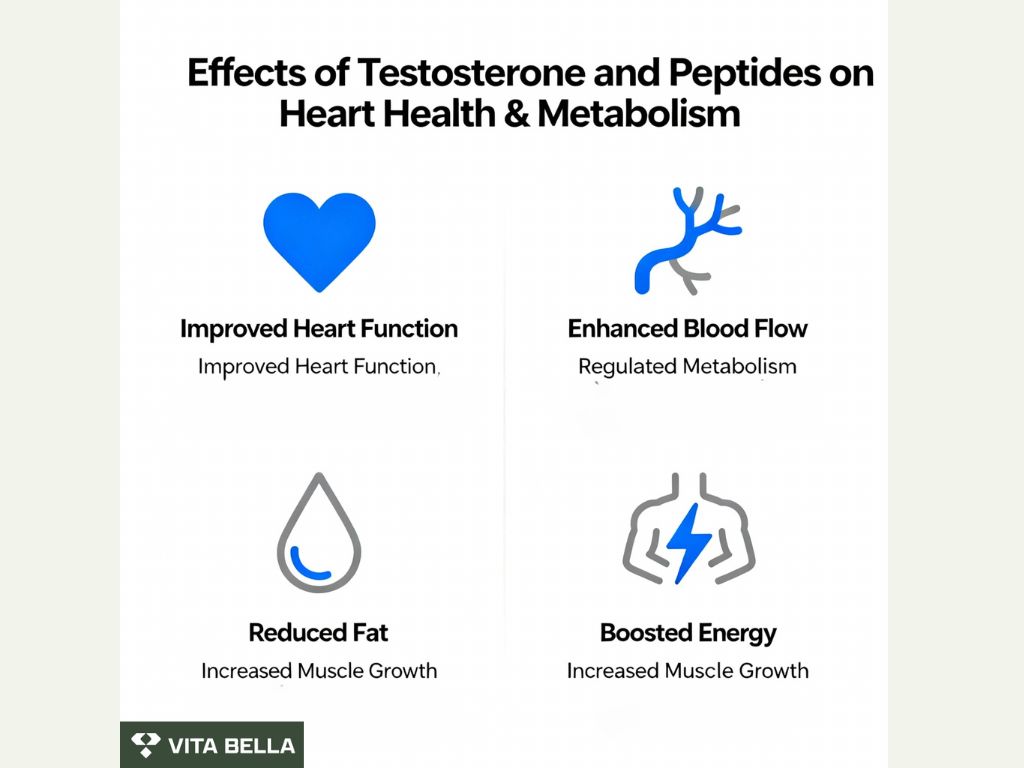The conversation around testosterone therapy (TRT) and peptides often focuses on muscle gains, but the real story lies in their potential to safeguard your heart and metabolism. Let's explore how hormones impact health and other benefits of the gym.
Although many assume that testosterone replacement therapy (TRT) and hormonal peptides are purely aesthetic, research 1 shows that restoring testosterone in hypogonadal men improves not only libido and muscle mass but also cardiovascular risk markers, such as lipid profiles, insulin resistance, and endothelial function.
Age-related hormonal decline, including testosterone and growth hormone/IGF-1 2, has been linked to higher risks of metabolic disease, type 2 diabetes, frailty, and cardiovascular dysfunction.
By restoring or modulating these pathways, TRT and peptide therapies may reduce long-term disease risks, support healthier metabolism, and strengthen heart health, making hormone balance a medical priority, not just a cosmetic choice. Learn how testosterone management can make a difference and partner with Vita Bella for expert guidance and safe, effective solutions.
Why Hormonal Balance Matters Beyond Muscle?
Hormones such as testosterone, growth hormone/IGF-1 3, DHEA, and others decline with age, contributing to increased visceral fat, insulin resistance, and metabolic dysfunction, not just loss of muscle mass. Balanced hormone levels support glucose control by improving insulin sensitivity and reducing risk factors for type 2 diabetes and metabolic syndrome 4.
Testosterone replacement in men with low T has been shown to improve endothelial function and reduce cardiovascular risk 1 markers, such as unfavorable cholesterol profiles and arterial stiffness. Peptides (and hormone therapies more broadly) aid lipid metabolism 3 by promoting favorable lipid fractions, decreasing LDL, and improving fat distribution, particularly reducing visceral adiposity, which is a key player in heart disease.
TRT and Cardiovascular Health
TRT improves endothelial function by enhancing nitric oxide-mediated vasodilation, reducing arterial stiffness, and supporting vascular health in hypogonadal men. These changes can lower long-term cardiovascular risk.
Studies 5 also show that TRT can favorably modify lipid profiles, often decreasing total cholesterol and LDL while sometimes increasing HDL, contributing to better atherosclerotic risk management.
Evidence suggests TRT may reduce systolic and diastolic blood pressure 6 in some patients by improving vascular compliance and endothelial function, although outcomes depend on baseline cardiovascular status.
Long-term TRT has been linked to reduced progression of arterial stiffness 7, a major predictor of cardiovascular events, supporting its protective role when appropriately monitored.
Overall, TRT in hypogonadal men may not only restore testosterone levels but also contribute to improved cardiometabolic health 8, lowering the risk factors associated with heart disease.
Peptides and Metabolic Syndrome
The effect of peptides on metabolic health can be given as
1- Growth hormone secretagogues (GHS):
Agents like ipamorelin, GHRP-2/6, ibutamoren, and sermorelin are increasingly studied as adjuncts to TRT. They improve body composition, help prevent fat accumulation 9, and counteract muscle atrophy in men with hypogonadism or metabolic syndrome.
2- Tesamorelin’s role:
As a GHRH analogue, tesamorelin boosts endogenous GH pulsatility and has been shown to significantly reduce visceral adipose tissue (VAT) 10 while improving triglyceride levels. Significantly, it does not worsen long-term glucose control.
3- Clinical outcomes:
In patients with excess abdominal fat, 52 weeks of tesamorelin reduced VAT by ~18% and lowered triglycerides 11 by ~51 mg/dL, alongside improvements in total cholesterol. Beyond aesthetics, GHS therapies target lipid metabolism, reduce VAT, and may mitigate systemic inflammation, offering broad cardiometabolic benefits 12.
Practical Benefits Beyond Aesthetics
1- Reduced visceral fat & improved insulin sensitivity
TRT and peptides like tesamorelin significantly reduce visceral adipose tissue (VAT), which is strongly linked to metabolic syndrome and cardiovascular disease. Tesamorelin has shown ~18% VAT reduction while maintaining stable glucose control. TRT also improves insulin sensitivity in men with type 2 diabetes or metabolic syndrome 13.
2- Better lipid profile & blood pressure control
Testosterone therapy lowers triglycerides and total cholesterol 14 while sometimes increasing HDL, supporting a healthier lipid balance. It can also improve blood pressure regulation by enhancing vascular compliance and reducing arterial stiffness.
3- Lower inflammation markers
Hormone balance reduces pro-inflammatory cytokines 15, which play a role in atherosclerosis progression. This anti-inflammatory effect contributes to systemic metabolic improvements.
4- Improved vascular health & reduced CVD risk
TRT enhances endothelial function and nitric oxide availability, improving vascular relaxation and lowering cardiovascular risk. Long-term therapy also decreases arterial stiffness, further protecting against cardiovascular events 8.
Optimize Your Hormones, Transform Your Life With Vita Bella!
Feeling constantly drained, struggling with weight gain, or noticing reduced stamina? These are often linked to low testosterone, which can quietly impact your cardiovascular health. Vita Bella provides comprehensive hormone assessments and safe, effective therapies designed to restore your hormonal balance. Our personalized approach ensures you improve energy, mood, and overall wellness while protecting your heart. Start your journey to renewed energy and confidence with Vita Bella’s expert care.

FAQs
1. Can testosterone therapy increase the risk of heart disease?
Testosterone therapy may influence cardiovascular risk, but current evidence is mixed. While some studies suggest benefits such as improved cholesterol and vascular function, others indicate potential risks like increased blood pressure or clotting. Decisions should always be individualized and supervised by a healthcare professional.
2. How does low testosterone affect heart health?
Low testosterone levels have been associated with higher rates of obesity, diabetes, and metabolic syndrome, all of which increase cardiovascular risk. Maintaining healthy hormone levels may support heart health, but treatment should consider overall health and potential side effects.
3. What are the safest ways to manage low testosterone?
Treatment options include injections, gels, patches, or pellets, each with pros and cons regarding convenience, cost, and monitoring needs. Lifestyle changes—such as exercise, weight management, and sleep optimization—can also help naturally improve testosterone levels.





















